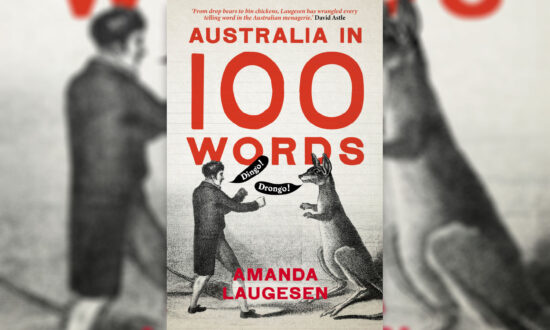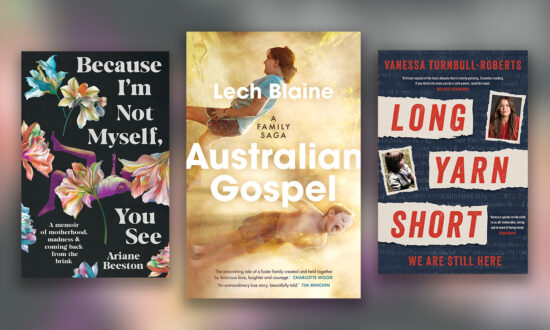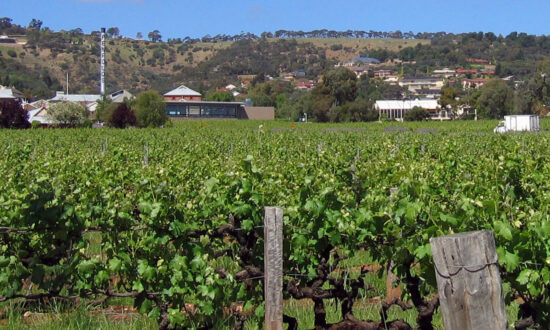It’s writers’ festival month across much of Australia these days: Melbourne Writers Festival (traditionally late August) and Brisbane Writers Festival (traditionally September) recently migrated to May – which has long been occupied by Sydney Writers Festival. If you’re a fellow book addict, you might be travelling to attend one of them, as I am this weekend – though personally, my favourite literary festival is our very own Adelaide Writers Week. And not just because it’s free to attend and spread out on beautiful lawns under March (most of the time) sunshine.
This year, I was lucky enough to host an event with Jonathan Lethem (who I asked to sign my ratty bookseller’s proof copy of his 21-year-old novel Fortress of Solitude, one of my favourites) and Nathan Thrall, whose brilliant book A Day in the Life of Abed Salama: A Palestine Story (Allen Lane) this week won the Pulitzer Prize for Nonfiction. I did not ask him to sign my book, but I probably should have.
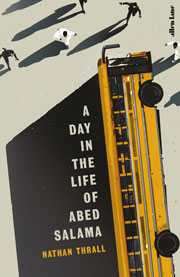 A Day in the Life of Abed Salama tells the story of Israel-Palestine and the West Bank through the microcosm of one bus crash involving Palestinian kindergarten children, two miles from where Thrall lives in Jerusalem. Abed Salama, the father of one of the children injured, was chosen as a focal point because his life reflects the recent history and current state of Palestine in so many ways.
A Day in the Life of Abed Salama tells the story of Israel-Palestine and the West Bank through the microcosm of one bus crash involving Palestinian kindergarten children, two miles from where Thrall lives in Jerusalem. Abed Salama, the father of one of the children injured, was chosen as a focal point because his life reflects the recent history and current state of Palestine in so many ways.
Part of Salama’s village, Anata, had been annexed to Jerusalem and a separation wall has created a ghetto. Outposts have been taken by Israeli settlers, who have their own exclusive highway to access Jerusalem, and there’s a nearby military base. The accident where the six kindergarteners (and a teacher) were killed happened on a road used by Palestinians, nicknamed “the death road”. The accident’s aftermath – with a half-hour wait for emergency help to arrive, and confusion about which hospital children were taken to (due to access requirements) – is also a result of the deeply unfair and deliberately difficult system.
Salama was arrested and imprisoned as a young man for joining an illegal radical wing of the Palestine Liberation Organization, after his hopes to attend college were dashed because the Israeli military shut down all universities after the first intifada. His arrest itself is representative: since the 1967 occupation, roughly 40 per cent of Palestinian men and boys have been arrested. Even Salama’s romantic relationships were affected by Israel’s punitive systems of borders and passes, which Thrall explains in fascinating, horrifying detail.
The author interviews the (surprisingly candid) man who created the maps that carved the West Bank into three areas – A, B and C, with different levels of “Palestinian self-governance”. Area C, administered by Israel, takes up 73 per cent of the “Palestinian” West Bank. Thanks to the maps, “what was once Palestinian territory dotted with Israeli settlements had been transformed… into its photo negative: an Israeli West Bank enveloping dozens of small enclaves of limited Palestinian self-rule”.
Thrall, a Jewish American living in Jerusalem, succeeds at making the world’s most complex, contested international conflict into a human story that reveals, in intricate everyday detail, a divided society where one group of citizens “live a radically different life because they are Palestinian”. I highly recommend it for anyone who wants to better understand the current conflict, and the conditions Palestinians were living in before October 7, 2023. Next Wednesday, May 15, is the 76th anniversary of the Nakba, the mass displacement and dispossession of Palestinians during the 1948 Arab-Israeli war – a good occasion to learn this history.
It’s also Mother’s Day this weekend – and of course, books are always a great gift option.
 One obvious option for literary mums is Australia’s own most recent prize-winner: last week, Waanyi author Alexis Wright became the first author to win the Stella Prize twice, this time with her epic novel Praiseworthy (Giramondo), which chair of the judges Beejay Silcox called “perhaps the great Australian novel”.
One obvious option for literary mums is Australia’s own most recent prize-winner: last week, Waanyi author Alexis Wright became the first author to win the Stella Prize twice, this time with her epic novel Praiseworthy (Giramondo), which chair of the judges Beejay Silcox called “perhaps the great Australian novel”.
Blending satire, ancestral myth, speculation and incisive commentary, the remarkable Praiseworthy revolves around four members of the Steel family. There’s a visionary seeking solutions to the climate crisis and the economic dependency of the Aboriginal people, a wife hoping to repatriate her Aboriginal/Chinese family to China, a suicidal son, and another son hoping to be white and powerful. Wright herself called it “hyper real” and reviewer Julieanne Lamond has described the reading experience as “like being in a mosh pit”.
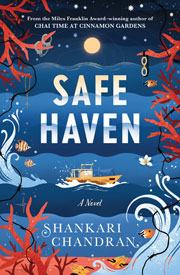 Last year’s Miles Franklin winner, Shankari Chandran, has a new novel out this month. Safe Haven (Ultimo) is set at a detention centre and told through the eyes of a Sri Lankan Tamil nun, Fina, who works there after being granted asylum herself. Appalled by the mistreatment she witnesses, she speaks out to the media – and is arrested and threatened with deportation as a result.
Last year’s Miles Franklin winner, Shankari Chandran, has a new novel out this month. Safe Haven (Ultimo) is set at a detention centre and told through the eyes of a Sri Lankan Tamil nun, Fina, who works there after being granted asylum herself. Appalled by the mistreatment she witnesses, she speaks out to the media – and is arrested and threatened with deportation as a result.
Fina’s fate is tied to that of a security officer who dies under suspicious circumstances, prompting an investigation. The novel’s tone was recently described by Good Weekend as combining “quiet fury and gentle humour”: an enticing combination. I’ve had her Miles-winning novel Chai Time at Cinnamon Gardens, set between a western Sydney nursing home for culturally diverse seniors and Sri Lankan civil war, on my to-read list for ages… and now I’m adding this one. (If my son is reading: hint, hint! Of course, that’s unlikely. Twenty-four-year-old sons don’t generally read their mothers’ book columns.)
It might be a brave relative who buys journalist Johann Hari’s latest book, Magic Pill: The Extraordinary Benefits and Disturbing Risks of the New Weight-Loss Drugs (Bloomsbury), as a Mother’s Day gift. The result might resemble when my mum was not very pleased with my dad for buying her gym equipment for her birthday one year. (He still maintains she said she wanted it; I still remember her face not being a happy one.) But I got Magic Pill for myself, and found it fascinating. It’s one of those books where my poor husband had to endure me reading interesting facts from it aloud while he tried to watch CNN.
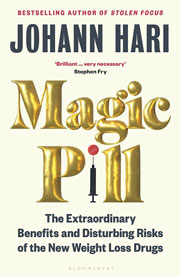 Hari, whose local KFC once gave him a Christmas card signed “to our best customer”, grew up eating and loving the processed, microwaved food his Glaswegian mother made, to the despair of his Swiss father, a chef whose admonitions for him to eat fresh food he consistently ignored, preferring to “starve” rather than eat his salads. Hari has also written compellingly about addiction (in Chasing the Scream) and here, he realises he’s addicted to bad food – and so are Western cultures. One thing he covers in this book is the role of the food industry in making us increasingly unhealthy, as a culture and as individuals. Obesity levels for adults in the UK, he writes, are now 26 per cent, and in the US, 42.5 per cent. I looked up a local comparison: in Australia, we’re in the middle, at 31 per cent.
Hari, whose local KFC once gave him a Christmas card signed “to our best customer”, grew up eating and loving the processed, microwaved food his Glaswegian mother made, to the despair of his Swiss father, a chef whose admonitions for him to eat fresh food he consistently ignored, preferring to “starve” rather than eat his salads. Hari has also written compellingly about addiction (in Chasing the Scream) and here, he realises he’s addicted to bad food – and so are Western cultures. One thing he covers in this book is the role of the food industry in making us increasingly unhealthy, as a culture and as individuals. Obesity levels for adults in the UK, he writes, are now 26 per cent, and in the US, 42.5 per cent. I looked up a local comparison: in Australia, we’re in the middle, at 31 per cent.
The central focus of the book, though, as its title suggests, are the new weight-loss drugs, Ozempic (designated to treat diabetics) and Wegovy (basically, Ozempic rebranded to treat obesity). Hari is, as he cheerfully calls himself, a “guinea pig”: he starts taking Ozempic in chapter one, and charts the results – both the immediate effect on his appetite and resulting weight loss, and the side effects (nausea and dizziness, which ease off but months later still recur about once a week and every few days, respectively).
As well as an 80 per cent drop in appetite and finding food “unfeasible” except in small quantities, he reports a flattening of his mood, which he’s unsure whether to attribute to the drug itself, or the absence of the pleasurable highs junk food used to deliver. He also interviews more than a hundred experts, from scientists and others taking the drugs, to food manufacturers.
Hari’s conclusions are that the health benefits of these drugs, which worryingly include a 50 to 75 per cent increased risk of thyroid cancer, are well worth it. (The overall risk of thyroid cancer to the general population is currently very low, at just 1.2 per cent, so even with the increase for Ozempic users, the risk remains small: a 50 per cent increase would raise it to 1.8 per cent.)
In the author’s case, he admits that he also wants to look good – and his “obesity” was extremely minor. He does consider the arguments of the body positivity movement, the potential for dangerously enabling people with eating disorders, the unknown risks of treating children and the fact that long-term effects could later surface. But he believes the health risks of obesity and the food industry’s deleterious influence over what we eat are ultimately more urgent.
Hari also raises the fascinating possibility, confirmed by some doctors and scientists, that these drugs may also work for addiction. He asks: What if they work “primarily on your relationship with rewards – and reduce your craving for things that can be bad for you across the board?”.
I had no interest in taking Ozempic when I read this book, and I still have none, though I was surprised to hear that my BMI is the borderline entry point for being a candidate. (I also have no interest in Botox, though I’ve noted my wrinkles.) And I’m aware Hari is, as he states, a journalist and not a scientist, so I’m taking this as an account, not the definitive one. But I feel like I have a much better idea of what lies behind the headlines now. And what will remain with me for some time after reading about how packaged, processed food is made is a sense that I really should be eating as much fresh food as I can, not just for my weight, but in terms of being healthy and feeling good.

Get InReview in your inbox – free each Saturday. Local arts and culture – covered.
Thanks for signing up to the InReview newsletter.
And returning to writers’ festivals, Adelaide’s not entirely missing out this month – Adelaide University is running a literary festival, Speaking from the South, from May 31 to June 2. Guests include JM Coetzee and fellow Nobel laureate Abdulrazak Gurnah, Gail Jones, Nicholas Jose, Evelyn Araluen, Kim Scott and Ali Cobby Eckermann. See you there!
Jo Case is a monthly columnist for InReview and deputy editor, books & ideas, at The Conversation. She is former bookseller at Imprints on Hindley Street and former associate publisher of Wakefield Press.
Support local arts journalism
Your support will help us continue the important work of InReview in publishing free professional journalism that celebrates, interrogates and amplifies arts and culture in South Australia.
Donate Here

